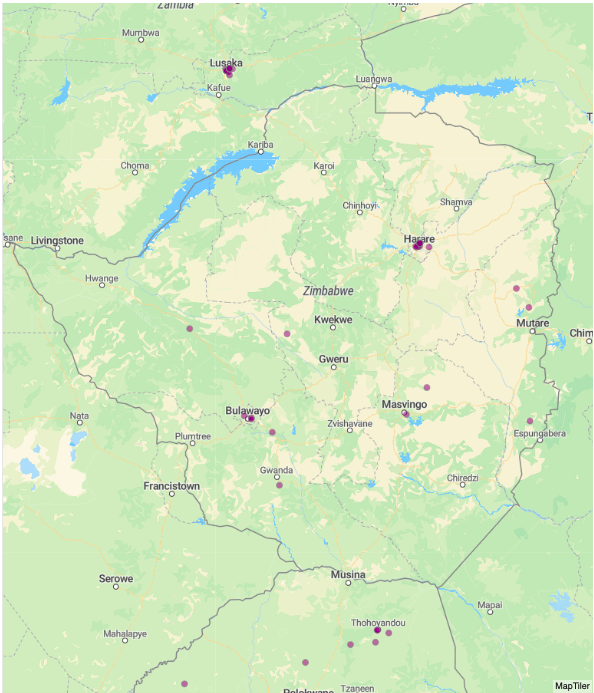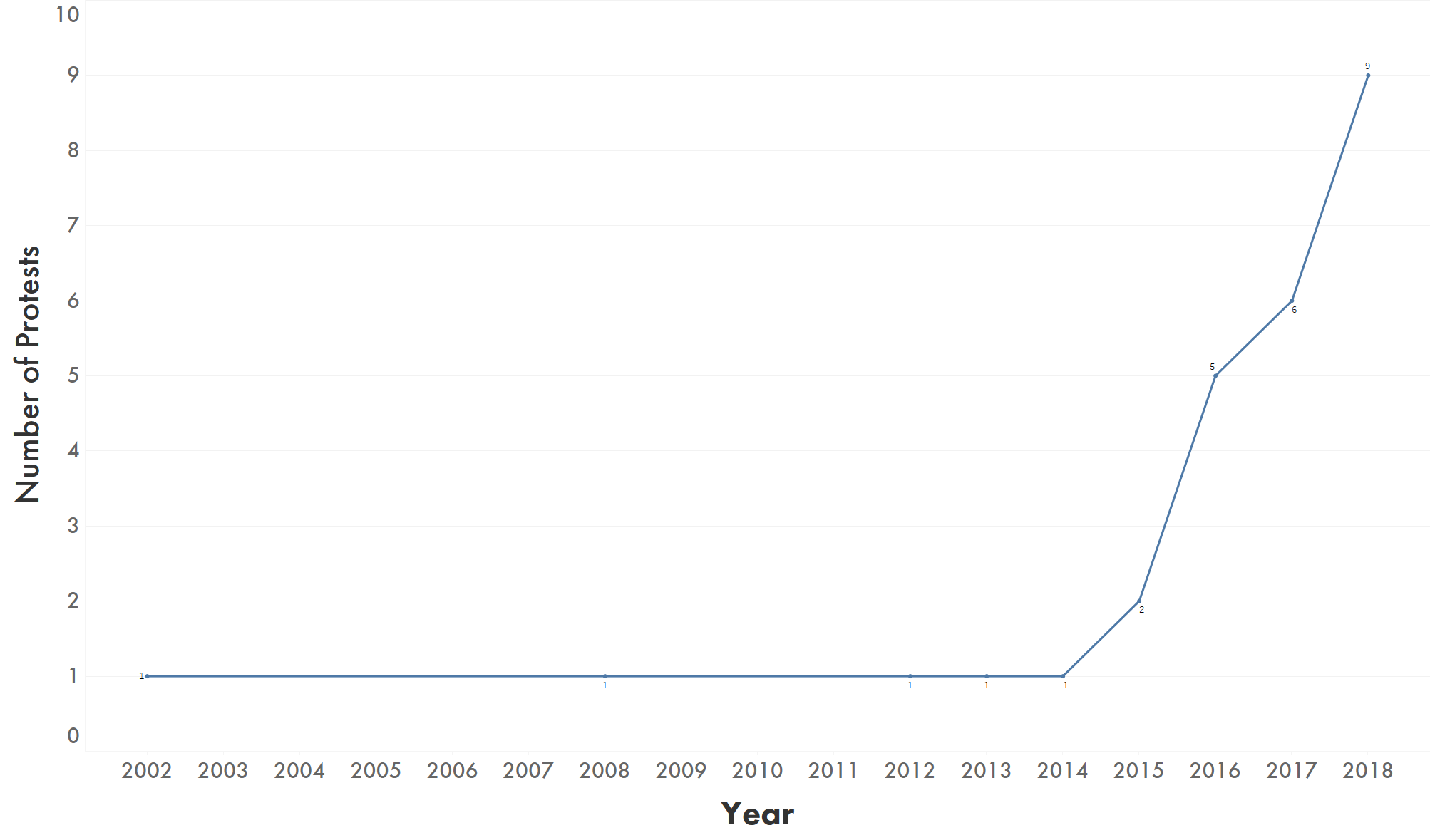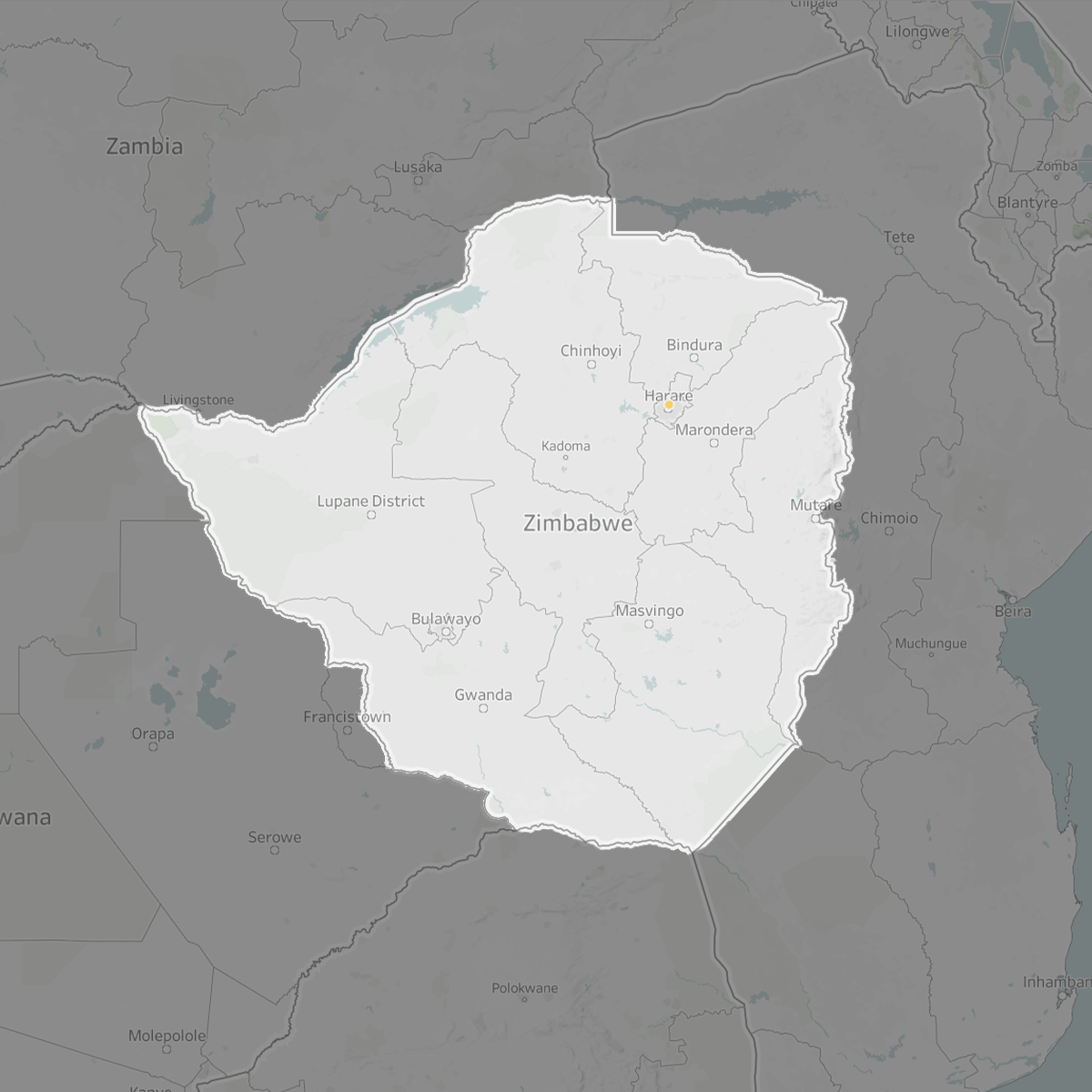Zimbabwe
Zimbabwe is a country of 12 million people. 1.4 million people live in the capital city Harare. Zimbabwe's main population is the Shona, who have been in the region for over 1,000 years. The Ndebele, a smaller group, arrived in the 19th century. From 1911-1964 the country was known as the Republic of Zimbabwe, and from 1964-80 it was known as Southern Rhodesia, and then Rhodesia from 1979-1980. Starting in 1965, the country was dominated by the white minority and colonial rule under the Unilateral Declaration of Independence. In 1980 the country achieved black majority rule, and Robert Mugabe became prime minister. Mugabe set out to redistribute the race and class-based inequalities, to redistribute land from the white minority, and promote economic development as a one-party socialist state. The 1980s brought an economic downturn and white flight. In 1998 Mugabe intervened in the Democratic Republic of the Congo's civil war to protect his own investments, and international aid to Zimbabwe was suspended as a result. By 2000, calls to end Mugabe's autocratic rule were present. Mugabe continued his aggressive program of confiscating white farm owners' land in 2002, which in turn left thousands of Black farmworkers homeless and unemployed. The property was not redistributed instead claimed by political allies. Mugabe's policies continue to economically distress the country through the 21st century, with several failed attempts by others to run against him. Each time, Mugabe used intimidation and police violence on opposition candidates and their supporters. In 2009 Tsvangirai joined Mugabe in a new government that altered the constitution and established a prime minister role. The change resulted in economic growth in the years following, though Mugabe was declared the winner of the 2013 elected under results characterized as fraudulent. Following this election, Mugabe's wife Grace began amassing political support for herself. In November 2017, the military seized power and placed Mugabe under house arrest and Grace's supporters. Demonstrations across the country highlighted that Mugabe had little support left, and on November 19th, he was removed from office with Mnangagwa elected in his place. Grace was fired from her position. Mugabe still refused to resign though Mnangagwa was inaugurated as interim president on November 24th, 2017. Elections were held for the first time in 16 years on July 30th, 2018, and after a delay, Mnangagwa was declared the winner.

DATA VISUALIZATIONS


PROTESTS
Zimbabwe-May-2016
Gutu, Mukaro High School
The Roman Catholic Diocese of Masvingo closed the school in response to two teachers being employed who are accused of "having masterminded pupils' protests in 2012" (Primary Source)
Zimbabwe-April-2018
Mashava, Great Zimbabwe University
Students protesting high fees and poor service delivery were shot at by police with guns and teargas. The students blocked road, threw stones and logs, as well as looted food and burn GZU flags in demand of better learning facilities. (Primary Source)
Zimbabwe-April-2018
,
Teachers threaten to strike on first day of school year over low wages. They are asking for salary increases. (Primary Source)
Zimbabwe-March-2002
Harare, University of Zimbabwe
Campus closes for over a month after due to anti-government protests over the presidential election (Primary Source)
Zimbabwe-March-2017
Harare, Sudanese Embassy
South Sudanese student have been occupying the embassy in Zimbabwe demanding the payment of their tuition and allowance fees. (Primary Source)
Zimbabwe-June-2016
Harare, Form Four Girls High School
Student's protest the killing of their peer by a taxi driver. (Primary Source)
Zimbabwe-January-2018
Harare, University of Zimbabwe
Students protested the awarding of a allegedly fake Phd degree to the former First Lady, Grace Mugabe. The Zimbabwe National Students' Union gave the Vice Chancellor of the University (Primary Source)
Zimbabwe-March-2015
Harare, University of Zimbabwe
Thousands of students stormed buildings at University of Zimbabwe protesting the lack of food in their residence halls. Riot police were called to the scene. University professors have also complained that their wages have gone unpaid. The school cites it has run out of money. (Primary Source)
Zimbabwe-October-2014
Harare, University of Zimbabwe
The university bans all kissing and other forms of intimate gestures, sparking a looming shutdown. (Primary Source)
Zimbabwe-June-2017
Harare, University of Zimbabwe
The university expelled all medical students after they staged a protest over school fees. (Primary Source)
Zimbabwe-August-2016
Bulawayo; Harare,
2,000 women activists protested for free education in Zimbabwe. The protest was organized by Women of Zimbabwe Arise (Primary Source)
Zimbabwe-April-2017
Harare, Harare Institute of Technology
Students staged a demonstration against poor living conditions and lack of entertainment. (Primary Source)
Zimbabwe-November-2017
Harare, University of Zimbabwe
Students protest after Robert Mugabe refuses to step down after it was anticipated that he would step down. Students boycotted exams and classes. (Primary Source)
Zimbabwe-July-2016
Harare,
Teachers, doctors and nurses strike over unpaid salaries. (Primary Source)
Zimbabwe-October-2008
Harare,
The National Student Union leader was arrested with dozed other injured when armed police violently suppressed and anti-government protest. (Primary Source)
Zimbabwe-September-2016
Harare, University of Zimbabwe
Three students took part in a peaceful protest at the University of Zimbabwe graduation where President Mugabe was in attendance. The students were arrested. (Primary Source)
Zimbabwe-April-2018
Bulawayo, Zimbabwe School of Mines
Students stage a demonstration over alleged poor services at the institution and the high fees they were paying. (Primary Source)
Zimbabwe-February-2018
Bulawayo, National University of Science and Technology (NUST)
Makerere University students riot and strike following a disagreement with university management. The students are calling for a change in school polices around fees, evening classes and dorm quality. (Primary Source)
Zimbabwe-June-2012
Masvingo, Mukaro Mission School
700 student snuck out of their dormitories early in the morning to march to the district education office to protest against the water problems and poor food at their school. (Primary Source)
Zimbabwe-May-2018
Bulawayo, Entumbane High School
Students and parents protest at school after they were "chased away" for trying to pay for the 2018 FInal Ordinary Level Examination fees due to their unpaid debts. (Primary Source)
Zimbabwe-August-2017
Mutasa, St Mathias Tsonzo High School
Students cut the security fence around their hostels and attempted to march to the provincial education director's office. The students smashed the window of the headmaster's vehicle, broke windowpanes and cut the security fence. The police were called and the students were "rounded up and ferried back to the school" (Primary Source)
Zimbabwe-March-2018
Chipinge, Takwirira Government High School
Students "explode" into a riot which drew police to campus. The students were protesting over Headmaster, cost of school uniforms, and school corruption (Primary Source)
Zimbabwe-March-2018
Lupane, Lupane State University
Students are demonstrating against authorities for allegedly exempting learners from the Department of Development students from paying accommodation fees. (Primary Source)
Zimbabwe-May-2017
Matabeleland South,
Teachers threaten to go on strike causing a closure of 40 schools. The teachers are striking after the government announced plans to close all 40 schools on account of low pupil enrollment. (Primary Source)
Zimbabwe-July-2015
Matabeleland South, Mzinyathini High School
Students protest after headmistress of their school refuses to let hearse, containing the body of their deceased school mate enter school grounds. Students, reportedly attacked the headmistress. (Primary Source)
Zimbabwe-June-2013
Manicalandia, Kriste Mambo
600 female students walked out of their school and attempted to march to the district education offices. They were intercepted by the police. The unrest begun after security guards at the school beat up five five school boys from a neighboring school. (Primary Source)
Zimbabwe-January-2018
Mabvuku, Mabvuku High School
High school students protest over high school fees. The protest was a result of the Fees Must Fall movement which began in South Africa. (Primary Source)